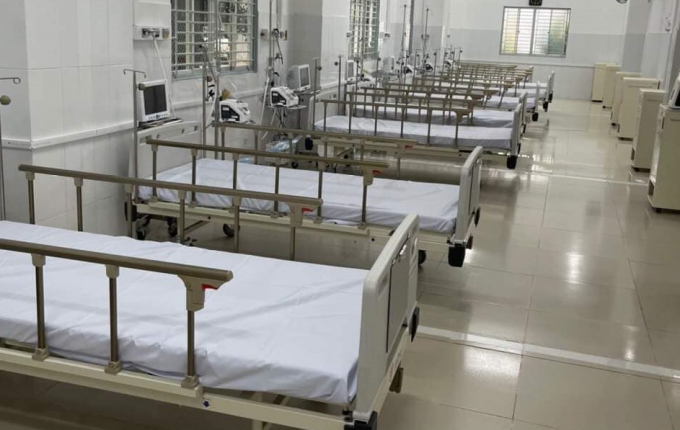Accordingly, in the face of the complicated developments of the COVID-19 epidemic, the number of cases in recent days has tended to increase. In the 7 days from April 5, 2023 to April 11, 2023, the whole country recorded 639 new cases, an average of 90 new cases per day. Through analysis of 639 new cases, 193 cases (accounting for 30.2%) were recorded in the group aged 50 and over, the number of hospitalizations has tended to increase and there have been 10 severe cases.
In the past 3 days alone (April 14, 15, 16, 2023), 2,272 new cases were recorded, an average of 757 cases per day.

Admission and treatment work needs to be proactive to respond to the risk of a possible COVID-19 outbreak (Photo TL).
In order to proactively respond to the epidemic situation, ensure effective admission, emergency care, and treatment of COVID-19 patients to promptly detect severe cases, promptly handle them, and minimize deaths, the Ministry of Health requests the Directors of the Departments of Health of provinces and centrally run cities, Directors of Hospitals and Institutes with beds under the Ministry, and Heads of Health of Ministries and branches to review, evaluate, and urgently implement the following solutions:
Review and update the plan for admission and treatment of COVID-19 patients of the province and the unit according to the 4-on-site principle; assign a specific number of hospital beds for treating COVID-19 patients to each unit; arrange human resources to monitor, care for, and treat COVID-19 patients when hospitalization is indicated;
Plan medicines, equipment, and medical supplies appropriate to plans for admission and treatment of COVID-19 patients when the epidemic may become complicated.
Proactively improve treatment capacity, especially focusing on improving emergency and intensive care capacity at medical examination and treatment facilities: Coordinate with the medical oxygen coordination department of the province and city to ensure the supply of medical oxygen for the treatment needs of COVID-19 patients at medical examination and treatment facilities.
Deploy training to review COVID-19 diagnosis and treatment guidelines for medical staff. Increase consultations at hospitals and with higher levels to seek professional opinions, and minimize the transfer of patients to higher levels.
For cases beyond professional capacity, when transferring to another hospital, it is necessary to consult and contact the upper-level hospital before transferring and ensure the safety of the transferred patient.
At treatment facilities, strengthen infection control measures, prevent infection to minimize the spread of disease in hospitals, especially strengthen protection for patients in high-risk groups (such as pregnant women, people with underlying diseases, the elderly, etc.), intensive care units, cardiovascular, artificial kidney, surgery, etc.
At the same time, strengthen the work of cleaning the outside environment, cleaning the hospital rooms, arranging convenient departments, suitable for the epidemic situation and ensuring a green, clean and beautiful environment.
For severe cases, suspected COVID-19 cases in hospitals, when rapid antigen test results are negative but COVID-19 is still suspected, it is recommended to perform PCR test to diagnose COVID-19 to avoid missing cases and spreading the disease.
Provincial and end-line hospitals treating COVID-19 need to monitor and clinically evaluate current hospitalized severe COVID-19 cases and send gene sequencing tests to assess the severity and critical level to report to the Ministry of Health for consideration and adjustment of professional guidelines.
Implement Resolution No. 30/NQ-CP dated March 4, 2023 and Decree No. 07/2023/ND-CP dated March 3, 2023 of the Government to ensure adequate medicine and medical equipment for treatment in general and COVID-19 treatment in particular.
Seriously report daily data on the COVID-19 Management System of the Department of Medical Examination and Treatment Management.
Source



































































































Comment (0)